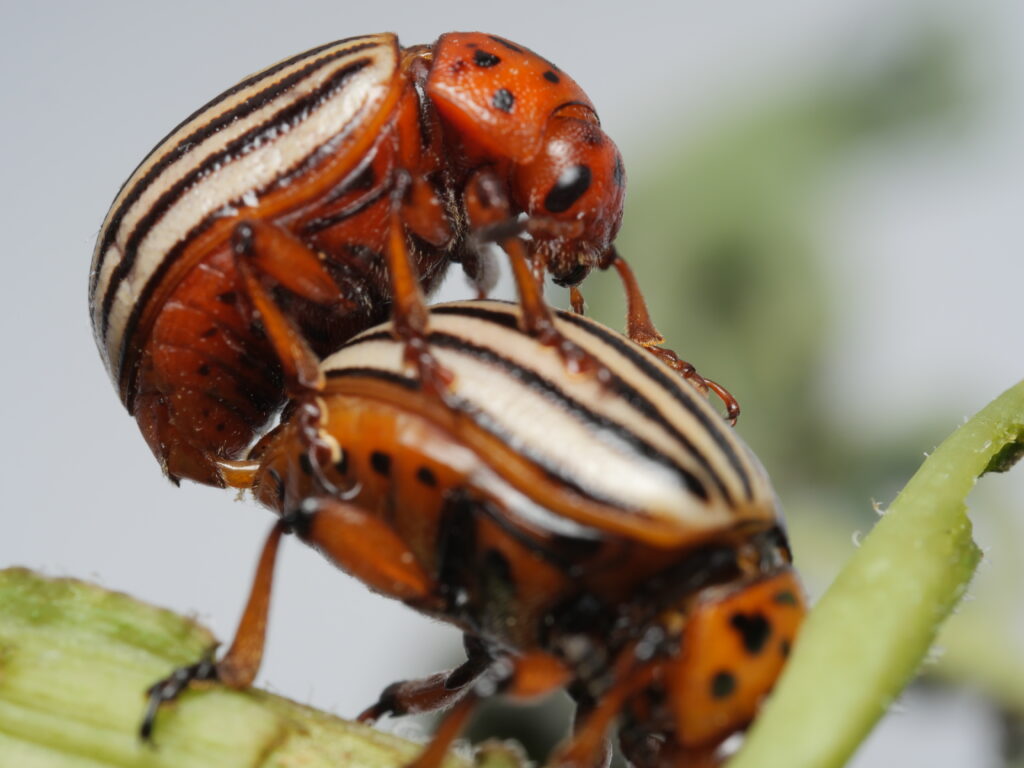This week’s guest is Alexander Butcher, a second-year master’s student in the Department of Crop and Soil Science. Alexander has a wide variety of interests related to minimizing food waste and improving global food security, but his current research focuses on protecting potato crops from insect pests.
Typical chemical pesticides are effective deterrents against invading insects but can cause significant harm to the environment and to humans. Such substances can present health risks to the farm workers that apply the pesticides as well as the consumers who purchase and eat the treated crops. Runoff from agriculture can also cause damage to surrounding ecosystems. In light of these downsides, scientists are interested in finding safer alternatives to conventional pesticides. Alexander studies an alternative class of chemicals called elicitors, which act as signals to activate defense mechanisms of plants. Plants have evolved numerous chemical and structural defenses for fending off insect and microbial attackers as well as competing against other plant species. One such product of this evolutionary arms race is the caffeine that you might enjoy in your morning cup of coffee. Elicitors can selectively turn these defenses on or off. This gives farmers and plant breeders a lot more possibilities for using plant defenses to manage insects.

Alexander’s research focuses on potatoes, which are an important agricultural product in northeastern Oregon along the Washington border. One of the biggest insect pests of potato is the Colorado potato beetle. Alexander is testing strategies for using two synthetic chemical analogs of natural plant signal hormones– salicylic acid and jasmonic acid — to stimulate the natural defenses of potato plants. Jasmonic acid is a phytohormone that promotes defenses against insects that chew, like the Colorado potato beetle. Some of Alexander’s research shows that these defenses can lower the weight of beetles. He thinks that this is due to protease inhibitors, which disrupt the enzymes insects use to digest proteins. Similarly, salicylic acid plays a major signaling role in plant development and defenses against insects that pierce into the plant and suck out fluids, like aphids. While these natural products have the potential to serve as affordable and effective pesticides, their sublethal effects lag behind the efficacy of more lethal chemicals. To help close this gap, Alexander has been researching how potato defenses induced by elicitors can impact the behavior of the beetle and its ability to reproduce.
Alexander first came to an interest in agriculture through his passion for food. He was classically trained in French cuisine and worked as a chef for twelve years, where he experienced first-hand the amount of waste that happens in the food system. His travels in countries affected by food insecurity helped solidify a desire to return to school, and he attended Portland State for a degree in biology. Despite his day job defending crops from insect invaders, he maintains a significant interest in bugs, founding an entomology club at Oregon State. Alexander will be transitioning into the PhD degree in the fall and switching topics towards defending vineyards from vine mealybugs. He eventually hopes to pursue a career in academic research and education.

To hear more about Alexander’s story, including why he advocates for insects as a sustainable protein source, tune in this Sunday, May 28th, at 7PM on KBVR 88.7 FM.
